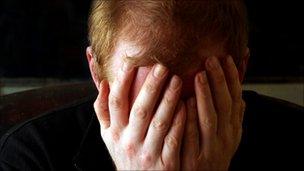Consumer Direct helpline to be run by Citizens Advice
- Published

Some complaints can get very frustrating for consumers to deal with
Consumer complaints ranging from rogue traders to energy companies will be dealt with by a charity in the future.
As part of the axe falling on quangos, the government-backed Consumer Direct helpline will be taken over by the Citizens Advice Bureau.
The Office of Fair Trading (OFT) is being stripped of its consumer protection role, with trading standards also taking on more responsibility.
The OFT is to be merged with the Competition Commission.
Local trading standards officers will deal with the OFT's previous high-profile work in taking on major consumer issues.
BBC business editor Robert Peston said: "The big question is whether local trading standards offices will have the resources or expertise to really challenge the behaviour of giant businesses."
Changes
Some 192 organisations will be abolished in the government's cull of quangos.
This will impact directly on consumers who will see a dilution of some of the groups that offer support and advice.
They include:
The Consumer Direct helpline - which offers immediate advice and forwards serious cases on to trading standards officers - will be overseen by Citizens Advice rather than the OFT
High-profile consumer right challenges will devolve to local trading standards officers from the OFT
Granting of licences to offer credit to consumers will go to the new Consumer Protection and Markets Authority
Consumer Focus - the government's official consumer watchdog is expected to be scrapped
Both Consumer Focus and Consumer Direct were set up by the previous Labour administration but, as revealed by BBC Radio 4's Moneybox on Saturday, they will no longer continue in their current form.
Trading standards officers campaigned for the Consumer Direct helpline to ease the pressure on dealing with frontline complaints from consumers to concentrate on investigating and prosecuting rogue traders.
'Active champion'
The latest figures from Consumer Direct showed that consumers complained the most about second-hand car repairs from independent traders, followed by mobile phones and televisions.
Business Secretary Vince Cable said that consumers were currently being represented by a "bewildering array" of specialist bodies which often overlapped each other.
He wanted funding concentrated on Citizens Advice and Citizens Advice Scotland for taking complaints and offering frontline advice.
Trading standards officers should be given responsibility for enforcement of all consumer law, with specific arrangements for Scotland and Wales.
"Both these groups have high public awareness and trust levels," Mr Cable said.
Trading standards officers, who are funded by local government, have previously called for more funding to carry out their enforcement work.
Andy Foster, operations director of the Trading Standards Insitute, said the door should still be open for the most complex cases to be taken on a national level.
"There are global consumer protection risks and no one council can deal with that alone," he said.
He said that a lot of the detail on the plans was still to come, and appealed for local councils to protect trading standards as much as possible from further funding cuts.
Citizens Advice said that it was still negotiating with the government on exactly how much extra funding it would receive for the extra work. It is 78%-funded by the government.
Local bureaux also get 43% of their funding from local government.
The charity's chief executive Gillian Guy welcomed the extra responsibility.
"Citizens Advice is already an active champion for consumers, helping them get a better deal and making it simpler and easier for them to get the information and advice they need," she said.
"We also use their experiences for effective policy advocacy, securing benefits for all consumers."
Mike O'Connor, chief executive of Consumer Focus, said: "The issue now is not who does the work but that the work is done well, at a time when consumers are facing difficult economic circumstances, especially those who are vulnerable."
- Published14 October 2010
- Published14 October 2010
- Published14 October 2010
- Published15 September 2010